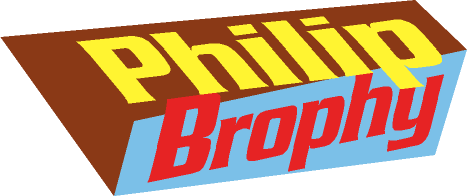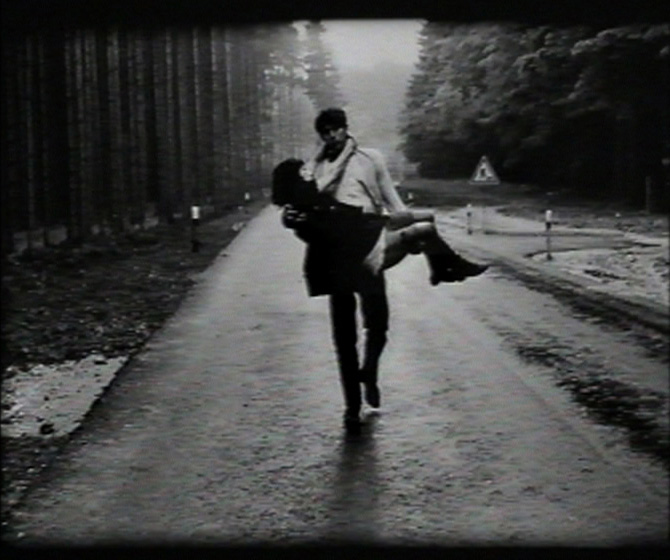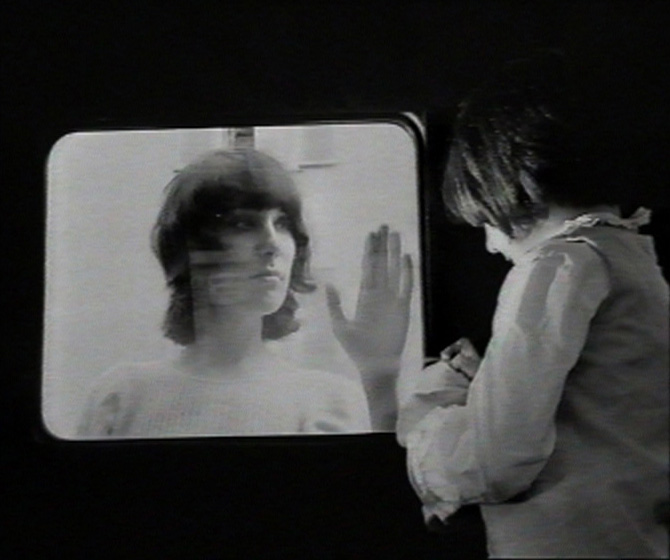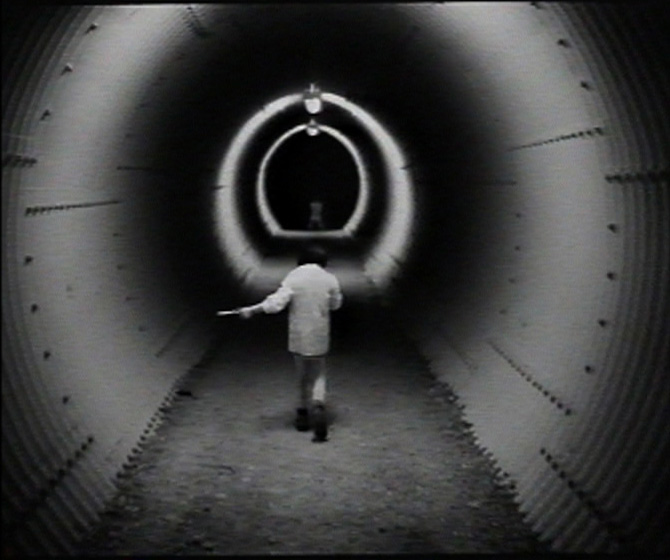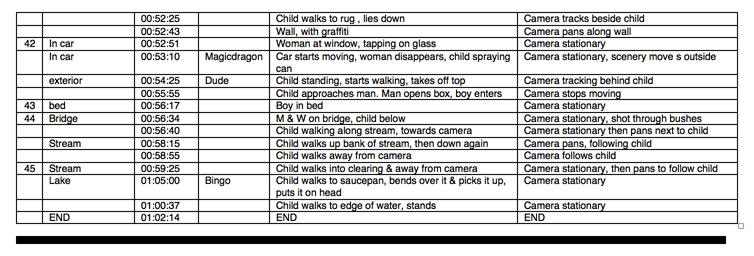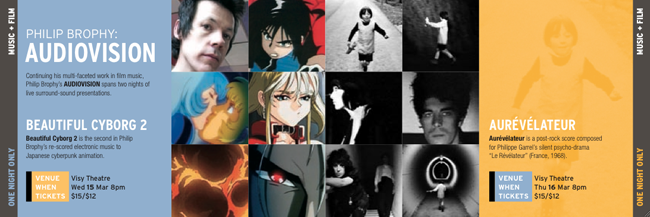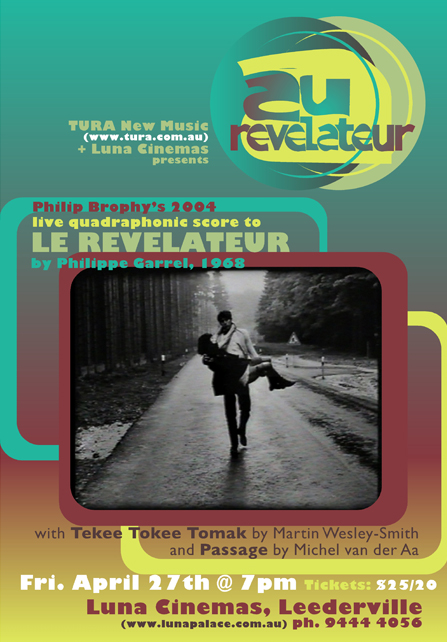Background
Aurévélateur was commissioned by the Melbourne International Film Festival, 2004. It features the composition of a score to Philippe Garrel’s one hour silent film Le Révélateur from 1968, presented and performed to the projection of the film. Aurévélateur was premiered at the Australian Centre for the Moving Image, Melbourne as part for the Festival. Research on Garrel and the Zanzibar film group was provided by Adrian Martin, and management of the event production was handled by Clare Stewart, cinema programmer at ACMI. For the live presentations, Philip plays keyboards, and live guitar is performed by Dave Brown. The mix is in quadraphonic audio
Credits
Composition, production & mix - Philip Brophy
Vocals - Sianna Lee & Philip Brophy
Guitars & bass - Dave Brown
Drums & keyboards - Philip Brophy
Engineer assistance - Sam Acres
Special thanks: James Hewison & Brett Woodward - MIFF; Clare Stewart & Andre Bernard - ACMI; Philip Samartzis, Jennifer Sochackyj & Tim Catlin - RMIT Media Arts
2009
DVD-R audio of quadraphonic mix released on Sound Punch records
2007
Luna Cinema, Perth (as part of the TOTALLY HUGE NEW MUSIC FESTIVAL)
2006
Powerhouse, Brisbane
Deckchair Cinema, Darwin (as part of the SOUNDS UNUSUAL Festival of New Music)
2005
CD of Dolby Surround mix released on Sound Punch records
2004
Melbourne International Film Festival, Melbourne
Overview
The Film
Philippe Garrel’s family psycho-drama is an infamous internalisation of the events of May 1968. Involved in the student barricades at the time, Garrel later that year went to Munich and filmed this silent B&W re-enactment of primal scenes, biblical allegory and political subtext. Working closely with three actors and two camera personnel, he shaped a ‘cine-tract’ which complexly maps its dramatic arcs through a series of mesmerizing moments and psychological schisms. Viewed 36 years later beyond the over-mythologized glory of May ‘68, the film’s originating layers of meaning can still be gleaned, but only through the cinematic sheen which renders the film more of a Lumière Brothers’ anthropological document than an enshrined political calling-card. The raw cinematography and the brutishly arcane lighting ‘reveals’ the palpable quality of the actors’ facial nuances, their ragged clothes, the awkwardness of their bodies, the flat beauty of the landscape and interiors. Maybe less polemical and more poetic at this point in history, the disquieting overlapping between the skewed and flayed emotional states of the family resonate unnervingly well in today’s dysfunctional climate.
The Score
Rather than pretend that we are ‘going back to 68’ by experiencing Le Révélateur in 2004, Aurévélateur is a reconstructed/reinvented score that disavows historical illusion and instead focuses on the emotional fissures of the film as forensic data: visible evidence that suggests motivation to the twists and turns of the film’s cycles of embrace and rejection. Avoiding recourse to the stereotypical ‘romantic agony’ which French cinema loves a bit too much, Aurévélateur presents an intense aural explication of the psychological nodes that direct the film’s momentum, providing a sensory synaptic read-out of the on-screen characters’ interior states. Eviscerating the harmonic formulae of late 60’s French pop chansons, the score works with a studio-based ensemble of organ, vibraphone, bass and drums. These sections and fragments are then recomposed and digitally processed, and mixed in quadraphonic sound. Embellished by live keyboards by Philip and guitars by Dave Dave Brown, Aurévélateur creates an appropriately dysfunctional sono-drama to match the disjointed beauty of the original film.
The overall concept behind composing a score to Le Révélateur was to create a parallel text that literally and figuratively 'plays with' (in the musical sense) the primary visual text. The idea was to work musically/musicologically in a 'cinephilia' mode by generating texts that talk back to the film rather than 'accompany' it as per the method used mostly in film scoring. The key formal aspect that developed and became a guiding principle was that the music became the 'backing' to the performers as if they were rhythmatized-musicians themselves. In the case of sections which feature sung lyrics, the performers are treated virtually as mime artists - mainly cued by the a few moments in the film where the woman looks at the camera. On top of this, the musical content is essentially a musicological map - in fact, quite possibly a true historical palimpsest rather than a metaphor for one - based on forward-tracing the influences that have accrued in the proceeding 36 years founded on the major nexus between the Velvet Underground's US drone rock and the European 'Krautrock' assimilation of the Velvet's pre-deconstructed rock sound. The actual momentum and musical dynamics of each track are directly responding to what I would perceive as the psychological dimension of the man/woman's love-hate drama as it unfolds as a compressed 'micro-theatre' in front of the child-audience.
Technical
Temp Tracks
After completing a log of all action in the film, (see below) a series of temp-tracks were placed along side scenes, mainly using the actors' body rhythms to determine tempo selection. This process determined and shaped the film into a suite of 10 movements. refinement of the beginning and end of each movement was done by relating to the camera movements - most of which were clearly defined arcs or tracks. (These camera movements in concert with the performers' gestural performance constitute the amazing sense of rhythm which is apparent in then original silent form of the film.)
As indicated earlier, the score 'tonality' was conceptually based on a musicological map which references and intertwines Garrel's background (with Nico), the time of the film (May '68), it's filming in Munich (both the Autobahn and the Black Forest), and the music of the time and since (from Krautrock to Post-Rock) which relates to the 'European road movie existentialism' signposted by Le Révélateur. The temp tracks used for Aurévélateur were:
Velvet Underground – "Venus In Furs"
Velvet Underground – "All Tommorrows Parties"
Nico – "Desert Shore"
Lou Reed - "Street Hassle"
Modern Lovers - "Radio On"
Neu – "Helden"
David Bowie – "'Heroes'"
Joy Division – "Love Will Keep Us Together"
Apart from deciding to do a cover version of Bowie's "'Heroes'", new compositions were then 'rebuilt' over these temp tracks which referenced the feel and tone of each track. There are also numerous harmonic/tonal cross-references (melodies from one song played on another; actual melodies from the original sources sounded in contra-keys; etc.) within the networking of the 10 movements in the film.
Narrative Structure
Lyrics
Diamond Sun
When a thorn goes in my side
When a bird flies in my head
When a child cries in the night
When I wake up in your bed
When a boy falls to the dark
When a girl grows up instead
When a tree moves in the park
When I know we’re never dead
We fly the night on wings we made from our feathers
Driving into the sun on our music together
We fade into the grey of our inclement weather
Drinking the snow and rain like diamonds for ever
Will I drink from any shelf
Will I bite into this bread
Will I take it upon myself
Will I let you in my head
Will love tear us apart
Will love reveal your heart
Will love get us to start on
What we had but couldn’t start
We fly the night on wings we made from our feathers
Driving into the sun on our music together
We fade into the grey of our inclement weather
Drinking the snow and rain like diamonds for ever
My Stars Tell Me
My stars tell me
Go - become a blur
So I move until I can hardly see
Your face is near
But I don’t need you now
That you look
After me in
My heart
The wind tells me
Go – become a breath
So I run until I can hardly breathe
My face is warm
Your head is hotter than
Both our hands
When we bathe in
My heart
The road tells me
Go – become a stone
So I sit until I can hardly feel
Our hair is light
Our skin is darker than
When our eyes
Could not see in
My heart
When I go into the dark
My son becomes my daughter
When I come back to the light
My love it turns to water
For my fire
No desire
